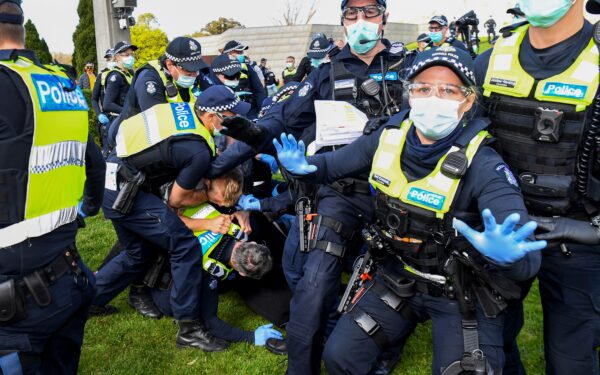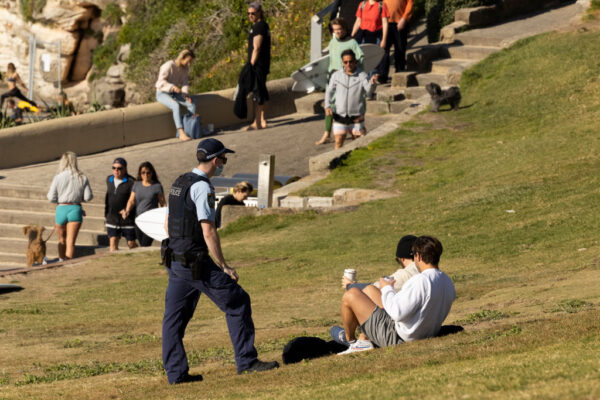COVID Fines ‘Did More Harm Than Good’: Report
Distressed Patriotic Flag Unisex T-Shirt - Celebrate Comfort and Country $11.29 USD Get it here>>

A report has highlighted the negatives of policing the COVID-19 pandemic through the overuse of fines during the strictest lockdown period in the most populous state in Australia.
Led by researchers from the University of New South Wales (UNSW), the report (pdf) concludes that in New South Wales in 2021, the large ‘on-the-spot’ fines used to punish noncompliance with public health measures was “regrettable, and should be avoided in the future.”
“Individuals were effectively criminalised for behaviours that would never previously have brought them into contact with the police or state-sanctioned punishment,” lead author and UNSW Law & Justice’s Prof. Luke McNamara said.
For example, residents were fined between $1,000 and $3,000 for sitting in a park or on a beach, as they were a breach of the COVID-19 rules that allowed residents to be in parks only for active exercise.
“The actions taken by lawmakers to criminalise non-compliance with COVID-19 fines lacked consideration, and as a result, communities were punished rather than educated.”
“Constant State of Flux”
The authors focused on the Delta wave for the report because a significant amount of making, amending and remaking of health orders and legislation occurred during this period, between June 2021 to Sep. 2021.
Public health laws were made and amended over 120 times, and one health order was amended 13 times in two weeks, in what the report describes as a “constant state of flux.”
“The volume of penalty issues and uneven distribution tell a powerful story,” McNamara said.
Between July and Sep. 2021, NSW police imposed $45.9 million in financial penalties on residents for alleged breaches of ministerial orders made under the Public Health Act 2010 (NSW).
This is more than 80 percent of the total value of fines issued from the beginning of the COVID-19 pandemic in March 2020 to Sep. 2022.
As of Oct. 2022, more than $15 million in fines are still outstanding and continue to have punitive effects on people’s lives.
Reduced Trust
Another finding of the report is that the issuing of these fines has damaged relations between police and the community in those parts of the state that experienced the most intense restrictions and aggressive penalties.
“When enforcing relevant restrictions, police must ensure their actions are proportionate to the threat posed to public health and necessary to protect public health,” McNamara said.
Rather than the police, who adopted a ‘zero tolerance’ and ‘ask questions later’ approach during the pandemic, the report recommended having future crises led by community and health organisations.

It also suggested that government and police use the softer approaches of engagement, education, and negotiation rather than punitive measures.
“The biggest lesson we can learn is that we should be very careful about imposing big fines as a mechanism of registering a need for compliance in the community. Fines are not simple, and it’s not just a slap on the wrist,” McNamara said.
Associate Prof. Maria Giannacopoulos said that the report is timely and important.
“It challenges the unjust impacts of the imposition of big fines and aggressive policing in the context of a public health crisis,” Giannacopoulos said.
“The report is significant as it warns that fines do not produce public safety and improve health outcomes but exacerbate harms experienced by already disadvantaged communities.”
Government Cancels COVID-19 Fines
Days before this report was published, the government cancelled over 33,000 COVID-19-related fines following a supreme court case in Nov. 2022. The judge ruled in this case that the penalties issued to three residents during the states’ public health lockdowns in 2021 were invalid.
The three residents were fined between $1,000 and $3,000 for breaching COVID-19 rules.
Police approached one of the three plaintiffs, Rohan Pank, while he was sitting in a Sydney park with his girlfriend during the state’s lockdown in Aug. 2021.
The police officers told him he had violated a public health order by not actively exercising at the park and issued him with a $1,000 fine.

“It was a warm day. We knew that sitting in parks, outdoor recreation was one of the few things that were allowed.” Pank said.
“A group of police officers came over and fined us for supposedly not currently exercising.”
After his review application for the fine was rejected twice by the state revenue collector, Pank sought legal assistance, bringing his case to the supreme court and two others who had been fined for COVID breaches.
Pank’s solicitor Samantha Lee thanked the barristers and clients who came forward to take the risk and bring justice to the plaintiffs. She said people in other states could follow suit and take legal action against their governments over COVID-19-related fines.
Alfred Bui contributed to this report.




